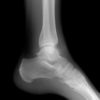I loved watching this past year’s World Series as the Chicago Cubs won their first championship in over a thousand years. (OK. That’s an exaggeration but it sure felt like that). I especially enjoyed the final out when third baseman Kris Bryant fielded a ground ball and threw out the runner at first base. As soon as the ball was hit, Anthony Rizzo, the Cubs’ colorful first baseman, ran over to first, looked down carefully to make sure his foot was on the bag, and then caught the throw that ended the game and the historic series.
As I’ve watched the replay of that moment, I’ve been intrigued to see how a trained, experienced, seasoned veteran first baseman, who had probably made that very play hundreds, if not thousands of times, still had the presence of mind to look down at his foot to make sure he would not mess up a crucial play with a sloppy mistake.
I think this can have relevance to our walks with the Lord. We need conditioning to be in the kind of spiritual shape to respond well to trials and temptations. And we need specific study and training for specific spiritual responses. But, in the heat of the moment, we also need reminders to practice basic elements of a mature, godly response.
In the first two parts of this series, I’ve used anger as the arena for illustrating my points. I’ll continue with that specific challenge. In the heat of the moment, when something happens that tempts us toward sinful anger, there are several techniques we can draw upon. I’ve found these to be helpful:
- Remind myself it’s best to pause, take in a deep breath, and think carefully before I speak.
- Quote James 1:19 to myself: “Everyone should be quick to listen, slow to speak and slow to become angry.”
- Ask God to fill me with His Spirit.
- Recall an African proverb I once heard: “You can always say what you have not said.”
- Count to 10. (I’m not kidding. Sometimes counting to 50 or 100 isn’t a bad idea).
Now here is a crucial point I want to make. These “in the moment” techniques are very important. But they’re not enough.
Unfortunately, they’re often offered as if they were enough. But they’re not. They don’t get to the root of the problem or address the depth of our sin, or draw upon the full riches of the gospel. They may start the process but fail to complete it.
These kinds of “in the moment” techniques might only serve as band-aids in places where we need surgery. Band-aids play very helpful roles as temporary coverings to protect against further damage. But, in some cases, we need cleansing of the wound, healing of deeper disease, or rehabilitation of damaged body parts. That’s why I wrote parts 1 and 2 in this series before writing this one. It’s also why I’ve still got part 4 to come.



